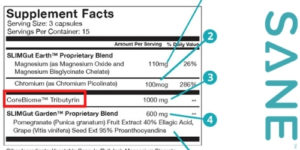Postbiotics: 3 Tips to Find What Really Works
You’ve probably heard about prebiotics and probiotics…but what are they? Good question!. All three are necessary for gut health — and even overall health — but postbiotics supplements have recently drawn special attention from researchers.
In fact, research suggests the positive health effects once attributed to probiotics may be due to postbiotics. 1
But first, let’s talk about the importance of gut bacteria.
Postbiotics & the Role of Gut Bacteria
Though most people think of bacteria as harmful organisms, most of them are actually helpful. And your body is home to trillions of bacteria, most of them located in your gut.
The community of bacteria and other microorganisms living in your gut is called the gut microbiome.
There is a balance of good and bad bacteria and other microorganisms within the microbiome. If the number and types of “bad” bacteria overtake the “good” kind, health issues can result. And these issues are not just confined to the gut.
Rather, the microbes in the gut have been shown to contribute to overall health.2
Research shows an imbalance of good and bad gut bacteria, known as dysbiosis, may contribute to obesity, type 2 diabetes, heart disease, inflammatory bowel disease, autism, asthma, celiac disease, and much more.3
Probiotics, prebiotics, and postbiotics help increase the number of “good” bacteria in your gastrointestinal tract. And postbiotics supplements may have a greater effect on the gut microbiota than scientists originally thought.
So, What are Postbiotics?
Postbiotics is a fairly new term for the waste products created from the interaction between probiotics and prebiotics. Specifically, when probiotics (good bacteria) eat prebiotics (plant fibers) in your intestine, they excrete postbiotic metabolites.4
Postbiotics can include the following compounds:
- Enzymes
- Peptides
- Teichoic Acids
- Short-chain fatty acids
- Polysaccharides
- Cell Surface proteins
- Organic acids 5
These substances appear to have a beneficial effect on health, possibly because they stay in the gut longer than probiotics do.
You can boost the production of postbiotics in your gut by increasing your consumption of high-fiber foods, such as raw asparagus, and fermented foods, such as sauerkraut. You may also purchase a postbiotic supplement.
Choosing the Best Postbiotic Supplement
Postbiotic supplements are not as widely available as the pro- or prebiotic variety. But they are gaining in popularity and are now available at some brick-and-mortar retailers and online. The trick is to choose the one most likely to work for you. How to you choose the best postbiotic supplement? Here are 3 tips that can help you do that.
1. Research the company
A good way to find out if the company is legitimate and produces high-quality products is to search for company reviews online. Search for reviews of the company and its postbiotic supplements.
2. Check if there’s a quality of assurance
A Good Manufacturing Practice (GMP) is the highest level of quality assurance a company can have. A GMP system ensures that manufactured products adhere to strict quality standards set by the US Food and Drug Administration.6
3. Research the science behind the postbiotic supplements
Not all postbiotic compounds have been scientifically proven to provide health benefits. Butyrate, a short-chain fatty acid, is the most widely studied postbiotic and the one that has the most scientific evidence showing beneficial health benefits.
Studies show butyrate may have a beneficial effect on irritable bowel syndrome, Crohn’s disease, colon cancer, type 2 diabetes, and many more. 7
The only problem is that butyrate is what’s called an “unstable” compound. This means that it breaks down quickly before getting to the lower colon, where it’s needed to improve gut health.
Postbiotics Supplements The solution? Tributyrin!
This natural form of butyrate found in butter has been shown to be more effective than other forms of butyrate. Unlike butyrate, tributyrin is “chemically stable,” which enables it to reach the colon.8 Tributyrin is your best choice among postbiotics:
Postbiotics Supplements in Summary
There you have it…tips for finding which postbiotics really work. Why would you want to spend a lot of time and effort researching postbiotics, though, when you can reach for this BREAKTHROUGH discovery — one that contains the scientifically proven tributyrin — that thousands of amazed users are raving about?!!!
Take this simple solution first thing in the morning, and let it do its job to help fix your gut issues.
>>Discover the superior patented form of this gut-healing ingredient clinically proven to help heal your gut and end your bathroom misery.
POSTBIOTIC BLOG POST SOURCES
1- Aguilar-Toaláa JE, Garcia-Varela R, Garcia HS, Mata-Haro V, González-Córdova AF, Vallejo-Cordoba B, Hernández-Mendoza A. Postbiotics: An evolving term within the functional foods field. Trends in Food Science & Technology. Volume 75, May 2018, Pages 105-1142- MacGill M. What are the gut microbiota and human microbiome? Medical News Today. June 26, 2018
3- MacGill M. What are the gut microbiota and human microbiome? Medical News Today. June 26, 2018
4- Patel RM, Denning PW. Therapeutic use of prebiotics, probiotics, and postbiotics to prevent necrotizing enterocolitis: what is the current evidence?. Clin Perinatol. 2013;40(1):11-25. doi:10.1016/j.clp.2012.12.002
5- Aguilar-Toaláa JE, Garcia-Varela R, Garcia HS, Mata-Haro V, González-Córdova AF, Vallejo-Cordoba B, Hernández-Mendoza A. Postbiotics: An evolving term within the functional foods field. Trends in Food Science & Technology. Volume 75, May 2018, Pages 105-114
6- Hawes, S. What is good manufacturing practice (GMP)? Safety Culture. Published May 8, 2020
7- Eyvazzadeh A. What Is Butyric Acid, and Does It Have Health Benefits? Healthline. October 25, 2019
8- Gaschott T, Steinhilber D, Milovic V, Stein J. Tributyrin, a Stable and Rapidly Absorbed Prodrug of Butyric Acid, Enhances Antiproliferative Effects of Dihydroxycholecalciferol in Human Colon Cancer Cells. The Journal of Nutrition, Volume 131, Issue 6, June 2001, Pages 1839–1843
[/av_textblock]







